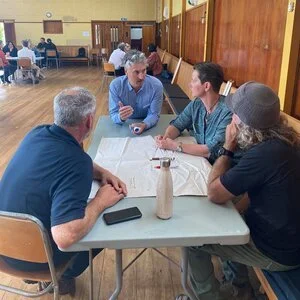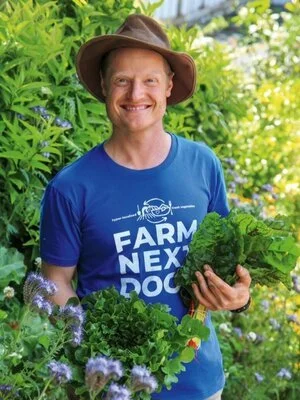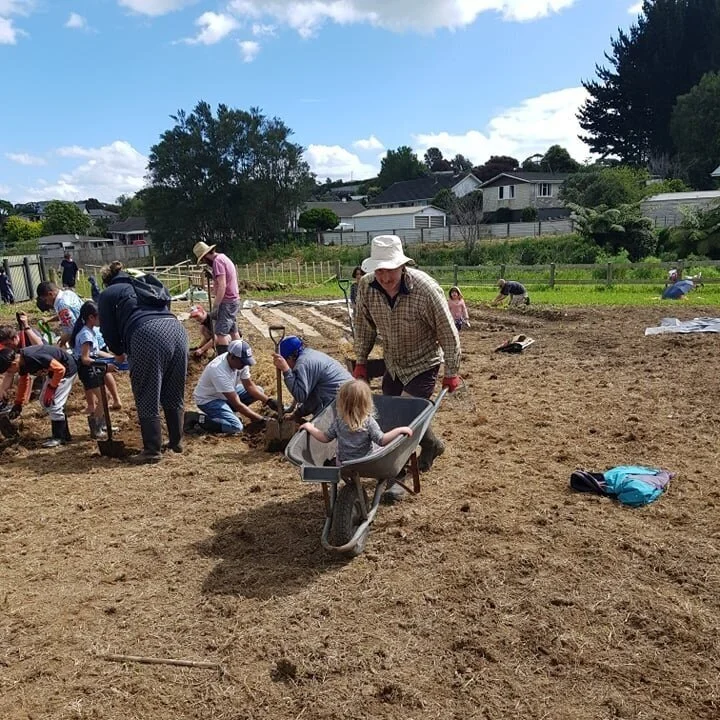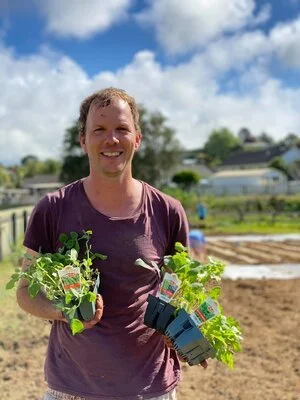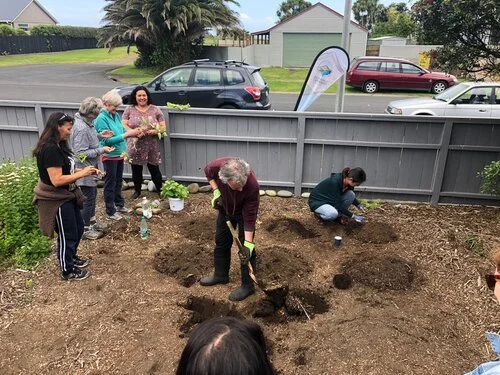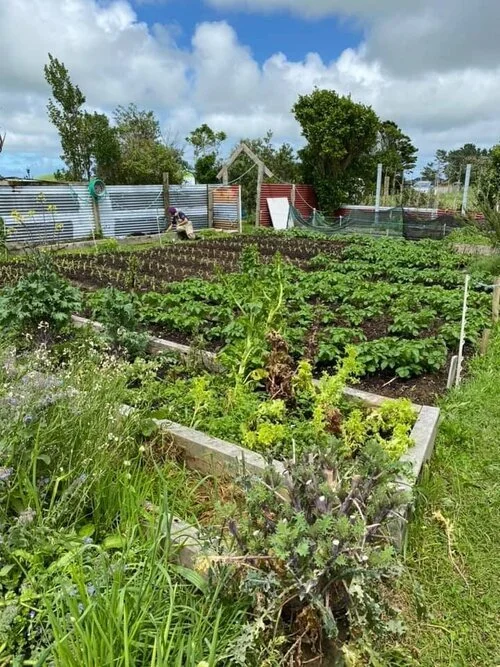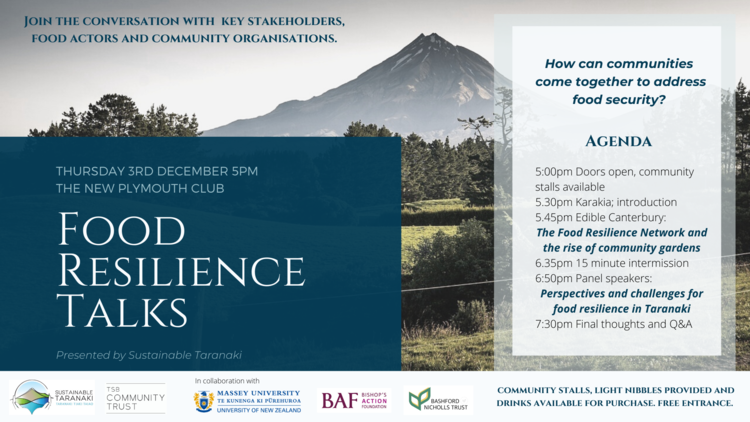Food Resilience - Let's Talk about it
What is food resilience and how can we address the challenges that it implies? The conversation around food resilience in Taranaki is getting more relevant every time, as more and more actors, those who wish to enact positive change, start to engage in ways to secure our access to healthy, nutritious and affordable kai.
Marfell Community Garden Working Bee/ Hui on 22nd November
From urban farmers and community gardens, to growing food in your backyard or at school, the question of food resilience is as present as ever in our region.
Through our different Sustainable Taranaki programs and outreach projects, like the Community Gardens, Behavioural Change and Food Secure Communities, we are looking at opening the conversation to Taranaki residents in order to learn and understand what food resilience really means and how we can achieve it together as one.
Food Secure Communities Plan
Sustainable Taranaki has recently been succesfull in applying for funding for the development of a Food Secure Communities Plan, which will gather stakeholders from around our Mounga in a conversation about our shared vision and how we can work together to achieve it.
Our kick-off hui was held on the 19th of November, and gathered over 30 representatives from local organisations that are involved in the food system: food growers, food banks, schools, councils, health specialists, educators and entrepreneurs. We had a diverse group of stakeholders share their different visions on food security, coming from their various backgrounds, comparing their experiences and coming together to a discuss what food security can look like in Taranaki.
This was just the beginning of the conversation, as we are looking at the next two years of collaborative working and co-creation to develop a plan that can secure access to healthy, nutritous and affordable food for our community. Get in touch if you want to get involved.
The growth of urban farming
Carl Freeman is one of the urban farmers leading the discussions around food security in our region. Through Farm Next Door, he plans on sharing the successes of suburban farming across the Taranaki region, and then replicating that model around New Zealand.
We are lucky in Taranaki to already have a thriving small-scale market gardening movement, a strong history of Maori food production, and many farmers exploring regenerative agriculture. Nothing sits in isolation, and so my aim for Farm Next Door is to bring together and capture the wisdom and insights learned here for others to replicate.
There is already a mix of established and aspiring farmers involved, and they are increasingly seeing other sectors connecting in with like-minded scientists, school teachers, doctors, and local politicians.
Anyone with an interest in transitioning to more regenerative agriculture practices is welcome to get in touch with Carl and get involved in the different discussions on this topic. The potential for what the group does is not limited as it will continue to evolve according to the development of the group itself and the research project.
The garden as a space for community resilience
Steve pushing Aria in the wheel barrow as many hands make light work, amongst the laughter and neighbourly aroha. This was taken at the 22nd November Hui at Marfell Community Garden.
Not many people know that we have several community gardens and orchards around Taranaki. You can check them out here, and get in touch with the contacts to volunteer to get involved. Newstart Gardens and Parihaka were featured on the Sustainable Backyards Trail this year and often hold working bees and events to support the growth and maintenance of the garden spaces. Newstart Gardens is also the location for the training of the Horticulture Level 3 Certificate with Land Based Training.
Urs, Community Garden Program Manager, holding seedlings donated by Mitre 10 Mega for the Community Garden in Marfell.
All within the month of November, Marfell Community Garden, the latest location to be established, has had three working bees. About 30 to 50 people arrived onsite for each Sunday hui, just across from the Manguatuku Stream along Endeavor Street in Marfell, to help cultivate the land. A tremendous amount of mahi took place, with 16 rows planted chock full of vegetable seedlings donated by locals and our Mitre 10 Mega in New Plymouth. The rotary hoe donated by Tool Hire Taranaki created the foundation for the rows, and the manure donated by Vicky Ashton (Robert Angus Real Estate) and an Ōakura supporter, and compost donated by Russell from Return 2 Earth all adds primo goodness to the soil.
All of this, plus the effort from everyone who donated their time to work the Earth, have made this community garden “endeavor” so incredibly successful from the onset. Not to mention, the involvement of the children in the community, whether they were planting, sifting soil, or riding their scooters along the path adding laughter to the air, has made this a wholesome and fulfilling series of community events, with more to come.
If you’d like to get involved, please contact Urs to find out about the group page and the next hui date. You can also read Catherine’s latest Stuff article: Friendships flourish along with vegetables in new community garden.
Back to the soil
Another aspect of the movement towards food security is focused on individual behaviours and making food not only accessible but relatable to our daily routines.
The Sustainable Backyards Trail has been a huge success this year, as we have seen a record number of visitors and more than 30 properties join the Trail. We also had a number of schools participating, who proudly showcased their different sustainable initiatives while students explained to visitors how they manage the vege garden.
The SBT is a great way for our community to get out there and see what others in similar circumstances are doing to make their properties more sustainable. A visit to the Trail guarantees getting so inspired that you will want to apply some of these changes to your own property and lifestyle.
Growing kai workshop
A phenomenon that is worth mentioning when we talk about individual actions is what we were able to observe during the Level 4 Lockdown back in March: the impressively high demand for seeds and gardening materials. Everyone seemed keen to get their hands dirty and start growing their own food at home. This motivation to use all that spare time to become self-sufficient, maybe as a response to the uncertain times we were living, also provoked an increased demand in learning opportunities around gardening, from workshops to horticulture courses, and even YouTube tutorials became highly popular.
Self-sufficiency is, however, not the only motivator behind the home-grown food movement. As our Behavioural Change survey showed (before and during Level 4 Lockdown), health is a significant motivator when it comes to engaging in sustainable behaviours. Growing your own veggies at home doesn’t only provide you with healthy, nutritious and affordable food, but gardening also makes you happier and healthier! One of the newest initiatives in town is Garden Prescriptions, led by a group of GPs who are keen to get their patients to the garden. The idea is simple: being outside in the garden can help treat a number of medical conditions, from depression to high blood pressure, and can lead to healthier lifestyles that help prevent serious illnesses.
All of these initiatives, projects and ideas show that food resilience is a current priority for our region, and we are proud to be joining efforts with so many other organisations in this challenge.
Join the conversation!
Join us for our Food Resilience Talks on the 3rd of December at the New Plymouth Club. We will listen to a guest speaker from the Food Resilience Network based in Canterbury share their experience and how they approached the problem of food security.
We will then engage in a lively conversation with local Taranaki actors engaged in urban farming, community gardens, school programmes and kaupapa Māori approaches to growing food.
Written by Alexandra Vernal


